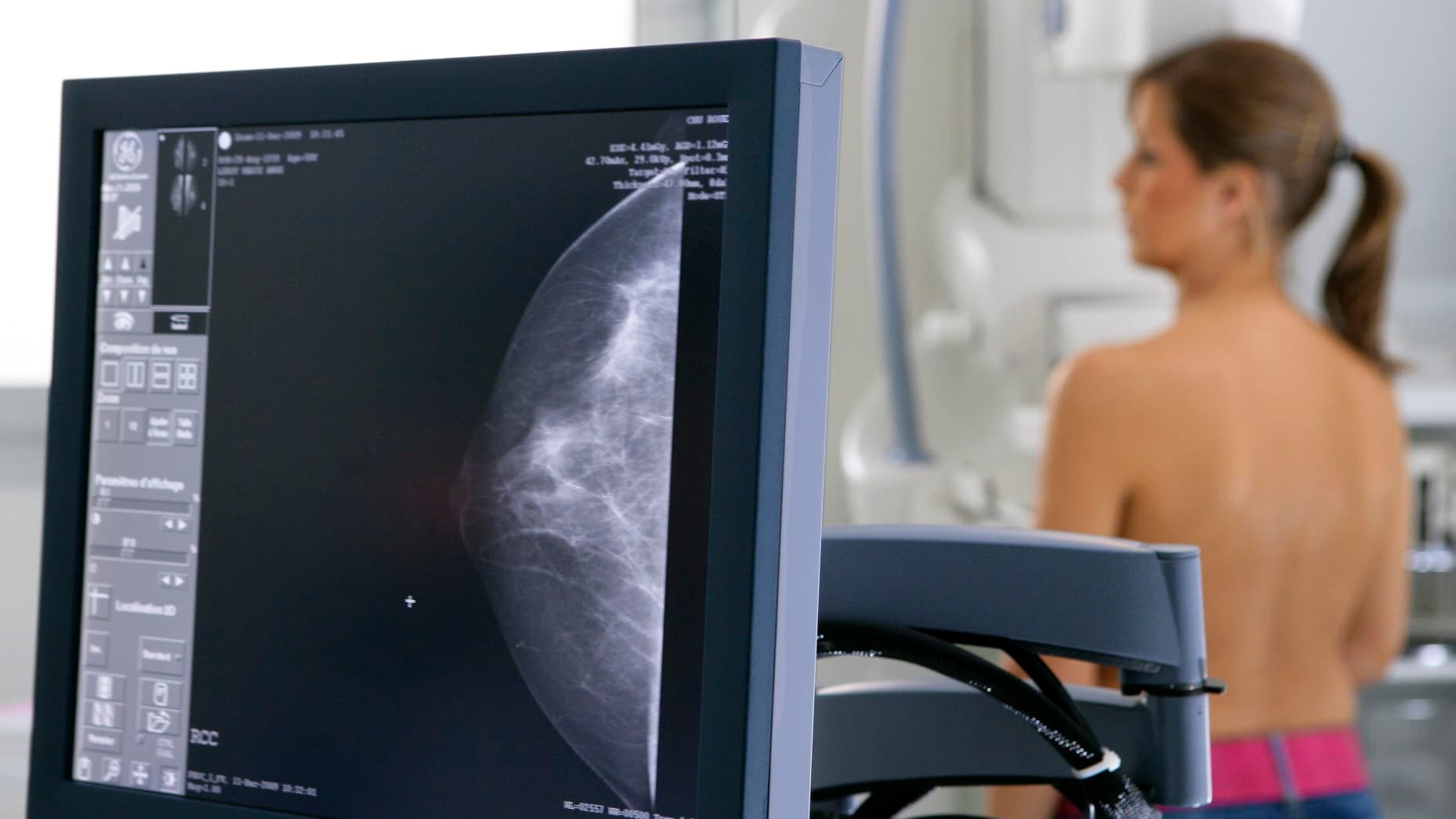What role does artificial intelligence play in the fight against breast cancer?
Artificial intelligence (AI) is increasingly asserting its important role in the medical field, especially in the fight against breast cancer. With the ability to analyze data quickly and accurately, AI helps improve disease detection, diagnosis and treatment, bringing great hope to millions of patients.
Breast cancer is one of the most common cancers in women worldwide, with millions of new cases diagnosed each year. Although medicine has made significant strides in treating the disease, early detection and effective treatment remain major challenges.

However, the remarkable advances in the field of AI have opened up extremely promising opportunities to improve the diagnosis and treatment of breast cancer. AI not only helps detect the disease more accurately, but also supports doctors in choosing the optimal treatment regimen and monitoring the patient's condition.
This article will explore specific applications of AI in the fight against breast cancer, from imaging to genomic data analysis, and how they are changing the way we treat this complex disease.
Diagnosis and early detection
One of the most important applications of AI in breast cancer treatment is to improve the accuracy of imaging techniques. While traditional mammography remains an important tool, it has limitations in sensitivity and specificity, making early detection of breast cancer difficult.
AI systems, especially those using deep learning technology, are able to analyze mammogram images in more detail and accuracy, detecting small, subtle signs that are difficult to detect with the naked eye. This opens up the opportunity to detect breast cancer at an early stage, when the patient's chances of treatment and recovery are higher.

For example, Google’s AI research company DeepMind has developed an AI model that outperforms radiologists in detecting breast cancer in mammograms. This model significantly reduces false positive and negative results and highlights suspicious areas, helping radiologists make more accurate and timely decisions.
In particular, this technology is very useful in areas lacking well-trained radiologists, helping many women access accurate and rapid diagnosis, contributing to improving breast cancer detection rates in disadvantaged areas.
Integrating AI into digital pathology
AI is playing a key role in driving advances in the field of Digital Pathology. Whole-slide imaging (WSI) allows pathologists to scan and analyze biopsy specimens digitally.
Once the slides are digitized, AI systems can process and analyze them to determine the location of malignant cells and predict the severity and invasiveness of the tumor. This method not only shortens the diagnosis time but also provides more accurate, objective, and systematic analysis, minimizing errors due to human factors.
AI’s ability to process massive amounts of data quickly and accurately has opened up opportunities for developing predictive analytics systems that can predict the progression of breast cancer in individual patients. AI models can predict the likelihood of cancer recurrence and metastasis by analyzing data from a variety of sources, including genetic information, medical history, and lifestyle factors.
This information not only helps doctors better understand the condition, but also allows them to personalize treatment strategies, tailored to the needs and unique characteristics of each patient, thereby improving treatment effectiveness and minimizing unnecessary procedures.
Developing and identifying new drugs has always been a time-consuming and expensive task. However, AI is changing this approach completely, helping to identify potential drugs more quickly and efficiently. Machine learning algorithms are able to analyze the molecular structure of compounds and predict their potential effects on breast cancer cells.
Additionally, AI can discover existing drugs that have been proven safe but could be repurposed to treat breast cancer, increasing the availability of new therapies without having to develop them from scratch.
AI in clinical trials
Clinical trials are vital for testing new drugs, but they often face problems such as patient recruitment, retention, and data management. AI is changing the clinical trial landscape by addressing these concerns. Natural language processing (NLP) systems can scan medical records to identify eligible trial participants, allowing patients to be matched with relevant studies more quickly.
Furthermore, AI-enabled platforms can track patient compliance with trial protocols and track real-time data, improving the accuracy and reliability of trial results. By improving the clinical trial process, AI accelerates the development of new therapies and brings them to market faster.
Virtual assistant
AI-powered virtual assistants are increasingly useful in supporting breast cancer patients throughout their treatment. These virtual assistants, often available on smartphones or other digital devices, can provide patients with personalized information about their health, treatment options, and side effects. Virtual assistants can also remind patients to take their medications, schedule appointments, and provide emotional support.

For example, Wysa - an advanced AI chatbot developed by India-based company Touchkin eServices - has applied conversational AI to provide emotional support to cancer patients, helping them overcome emotional barriers during their diagnosis and treatment journey.
This virtual assistant ensures that patients can always access information and receive the support they need, regardless of the time of day or night. Furthermore, AI is creating groundbreaking changes in remote monitoring, especially for patients undergoing breast cancer treatment, helping to improve the efficiency of care and patient peace of mind.
Patient monitoring
Smart wearables and modern sensors allow for continuous monitoring of a patient’s vital signs, mobility levels and symptoms in real time. The collected data is then processed by AI systems, which quickly detect any abnormal changes and immediately notify the healthcare team. This combination not only improves diagnostic accuracy but also ensures that patients receive timely intervention when needed.
Continuous monitoring enables rapid response, reducing risks and improving patient outcomes. For example, if indicators such as heart rate or body temperature indicate signs of infection, the medical team can intervene promptly, preventing the risk from developing into more serious health problems. This not only improves the quality of care but also ensures maximum patient safety.
Challenges of using AI in the fight against breast cancer
While AI offers great potential in breast cancer treatment, it also poses a number of challenges and ethical questions that need to be thoroughly addressed. One of the most important issues is data privacy. AI systems rely on processing large volumes of patient data, leading to concerns about how data is collected, stored and used. Therefore, ensuring patient information is secure and used transparently and responsibly is not only a legal requirement but also a foundation for building public trust in this technology.
Another concern is the potential for bias in AI algorithms. If the data used to train models is not representative of the diversity of the population, the algorithms may perform poorly with certain patient groups. This could lead to disparities in diagnosis and treatment outcomes between different groups. To address this, it is important to ensure that AI systems are developed and trained on diverse data sets, so that they serve everyone fairly and effectively, regardless of ethnicity, background, or socioeconomic status.
Furthermore, integrating AI into clinical practice requires significant investment in both infrastructure and specialized training. Healthcare professionals must not only be equipped to operate AI tools effectively, but also understand how to analyze and apply the findings from these systems in practice. However, this transition can be challenging, especially in resource-constrained healthcare settings where the implementation of new technology is often difficult.
In summary, despite the challenges, the future of AI in breast cancer treatment is promising. As technology advances, AI systems will become smarter and more effective. In particular, the combination of AI and other breakthrough technologies, such as genomics and precision medicine, promises to revolutionize the way we detect, treat, and even cure breast cancer. This prospect opens a new era where technology and medicine work together to improve the quality of life for millions of people.
